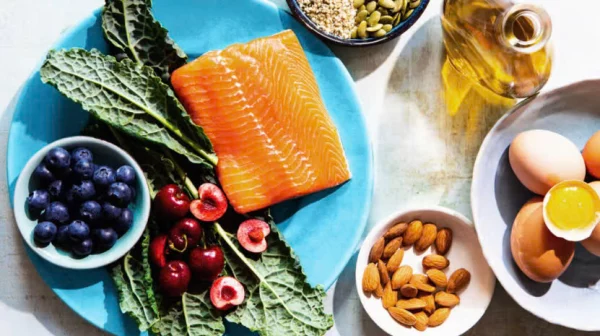Diet not only affects physical health but also plays a significant role in maintaining brain health. A healthy diet can help reduce the risk of age-related cognitive decline, and the MIND diet is one of the most notable approaches. The MIND diet, short for “Mediterranean-DASH Diet Intervention for Neurodegenerative Delay,” combines two well-known diets: the Mediterranean and DASH (Dietary Approaches to Stop Hypertension) diets. Studies have shown that it reduces the risk of cognitive decline, especially in women.

Recent studies have shown that following the MIND diet can significantly reduce the risk of cognitive decline and slow down the aging process of the brain. A study published in the journal Neurology found that individuals who strictly follow the MIND diet have a lower risk of cognitive decline, and the rate of cognitive decline slows down over time. These effects were particularly notable in women, with adherence to the MIND diet helping to reduce the risk of cognitive decline and slow the process in this group.
According to research, the MIND diet helps reduce the risk of cognitive decline in both white and African American Americans, but the effect is more pronounced in African Americans. “The MIND diet can slow down cognitive decline in women, especially African American women, according to a long-term study” – this is a comment from a research team at Rush University (2015). They also pointed out that the MIND diet is not just a diet, but a lifestyle that provides long-term benefits for brain health.
“Increasing the intake of antioxidant-rich foods and neuroprotective compounds like anthocyanins in berries can support cognitive function, improve memory, and reduce the risk of cognitive decline with age,” – according to Michelle Routhenstein, a nutritionist at Entirely Nourished. Berries, especially strawberries and blueberries, are recommended in the MIND diet due to their high content of anthocyanins and flavonoids, which help combat brain aging.
The MIND diet primarily consists of fiber-rich foods and nutrients essential for brain health, such as dark leafy greens, berries, nuts, whole grains, and healthy protein sources like fish and poultry. Studies have shown that these foods can reduce inflammation, protect brain cells from damage, and improve memory. Additionally, the MIND diet encourages limiting the consumption of red meat and processed foods, as they may harm brain health when consumed excessively.
The MIND diet promotes a varied eating regimen, not only to slow cognitive decline but also to improve overall health. Foods like fish, poultry, fresh vegetables, and whole grains provide a perfect combination of essential nutrients and anti-inflammatory compounds, helping to protect the brain from age-related damage. However, adjusting your diet should also go hand in hand with other healthy habits, such as maintaining physical and mental activity, to optimize brain health.
“The MIND diet provides all the essential nutrients for the brain while minimizing the negative effects of processed foods, protecting the brain from cognitive decline over time,” – Scott Kaiser, Director of Cognitive Health for Older Adults at Pacific Neuroscience Institute.
Maintaining the MIND diet is not difficult, but it requires patience and determination from each individual. If you’re concerned about protecting memory and brain health as you age, shifting towards a healthier diet can be an excellent choice to slow cognitive decline and improve the quality of life in the long run.


HPX24h > Healthy Eating > MIND Diet – The Secret to Protecting the Brain and Preventing Cognitive Decline
Tagged Articles
Heart and Brain Health: How to Effectively Prevent Cognitive Decline?
Top Reads from This Category
Healthy Eating
The optimal diet for leaky gut syndrome: Scientific solutions and practical advice
Healthy Eating
The Reasons You Should Eat These Fruits During Pregnancy to Reduce Fatigue and Anemia
Healthy Eating
Does Drinking Water Help with Weight Loss? The Science Behind It and How to Apply It Properly
Healthy Eating
Essential Nutrition: The Golden Key to Comprehensive Health
Healthy Eating
What Is Nutrition? Why Is It Important For Health?
Healthy Eating
Ways to Reduce Sugar in Your Diet to Prevent Diabetes
Healthy Eating
How to Follow the 5:2 Diet: The Key to Effective Weight Management
Discover New Topics
Health
5 Essential Things Every Woman Should Know About Menopause
Science
Why Do Adult Brains Continue to Generate New Neurons?
Healthy Eating
Vegan Diet: An Effective Weight Loss Solution or a Nutritional Challenge?
Fitness
How Often Should You Work Out Each Week for Effective Weight Loss and Muscle Gain?
Science
Nanotech Technology to Destroy Blood Clots: A New Breakthrough in Stroke and Heart Attack Treatment
Health
Are ‘Forever Chemicals’ Present in Bandages? How This Could Affect Your Health
Science
Direct Brain-to-Brain Communication via the Internet
Healthy Eating
How to Create a Diet that Reduces Disease Risk While Still Being Delicious?
Parenting Tips
Fun Facts for 3-Year-Olds: Exploring the World of Animals and New Foods
Space
The Youngest Recorded Supernova: Unveiling the Mystery of a Star’s Death
Fitness
HIIT Training: A Long-Term Remedy for Brain Health
Animals
Decoding Whale Songs: When the Community Joins to Uncover the Ocean’s Mysteries
Fitness
Fat-Burning Heart Rate: The Key to Optimizing Your Workout